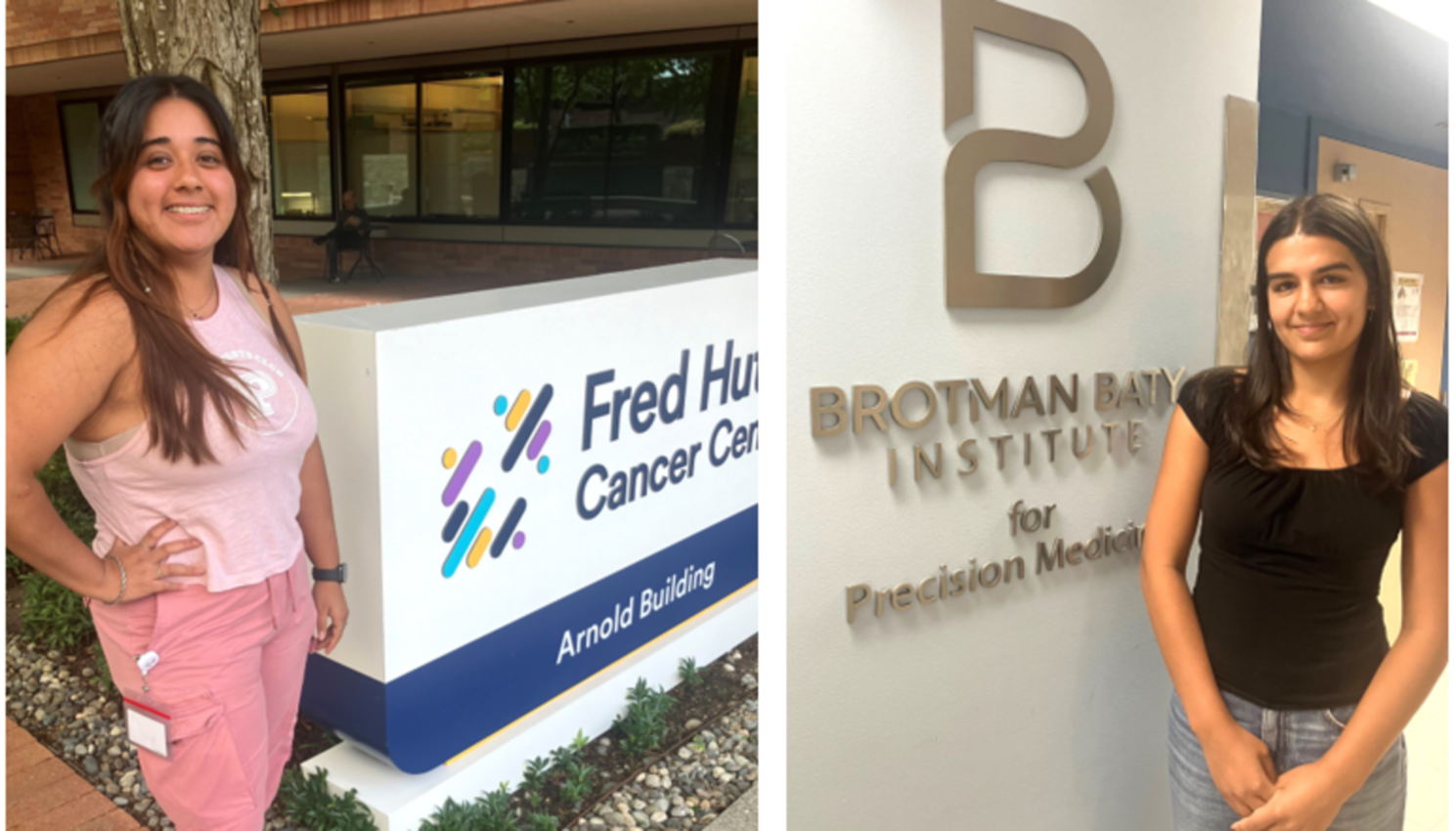 Valeria Castellanos Rodriguez, left, and Clare Malhotra: 'I’m OK that some of my experiments are going to fail, but I know I did my best. This is science.'
Valeria Castellanos Rodriguez, left, and Clare Malhotra: 'I’m OK that some of my experiments are going to fail, but I know I did my best. This is science.'
Clare Malhotra and Valeria Castellanos Rodriguez are one year apart in age, attended high schools 39 miles from each other in Southern California, and are pursuing careers as researchers. But their paths never crossed until they sat across from each other on a picnic bench recently at the annual BBI intern luncheon.
Malhotra, 20, and Rodriguez, 21, are serving this summer in internships at BBI and Fred Hutch Cancer Center, respectively. Their work is sponsored by BBI. Interestingly, the catalysts for their future careers are striking similar: family.
“I have an older sister who took biomedical courses in high school,” said Rodriguez, who is studying the role of amphiregulin in estrogen receptor positive breast cancer alongside the Hutch’s Kevin Cheung, M.D. “She would come home and tell me how interesting the classes were, explaining everything from pipetting to how triage in hospitals work. I was intrigued.”
That intrigue was fostered by classes at Mission Vista High School in Oceanside, California, based on specialized curricula developed by “Project Lead The Way,” a nonprofit organization that focuses on STEM-related resources for K through grade 12.
In 2021, Rodriguez entered California State University, San Marcos, located 15 miles from her home in Oceanside. Among the reasons she selected the school was scholarship package she was offered: free tuition.
“The school has specialized programs for minority students interested in science,” she said. “One of the more interesting aspects is the size of the small size of the student body. Some of my classes have only 20 to 30 students. That makes it easy to ask questions and to engage with professors.”
Rodriguez expects to complete her undergraduate work next May with a Bachelor of Science in Biological Science with a concentration in Molecular and Cellular Biology; she has started work on graduate school applications.
Her studies have taught her a vital lesson at young age that all scientists eventually grasp: “In the lab, not all experiments turn out as planned. You often get results you do not expect. I’m OK that some of my experiments are going to fail, but I know I did my best. This is science.”
Like Rodriguez, Clare Malhotra was inspired to study science by family; her parents are both physicians.
“I wasn’t interested in being a physician, but I have always been interested in math,” she said. “My parents never pushed me toward medicine, but they helped me decide what would be best for me. It was my mom who mentioned to me that data science could be a good way to learn computational skills to apply to science.”
During the summer between 10th and 11 grade at the Bishop’s School, a private college-prep school in La Jolla, California, Malhotra participated in a research effort that led her to being named the lead author on a peer-reviewed paper, “Assessing the impact of age and inhalant use on sleep on adolescents,” published in the Journal of Clinical Sleep Medicine. The research Malhotra contributed included analyzing data concerning responses to online questionnaires via social media when she was in 10th grade.
“I narrowed in on adolescents because I was an adolescent,” she said. “We conducted the surveys on social media sites, and I helped brainstorm how to inspire people to click on links and complete the surveys.”
Her current internship at BBI under Principal Investigator Lea Starita, Ph.D., focuses on genetic variants of unknown significance.
“There are a lot of mutations out there, and we don’t understand what they do and how they may affect our understanding of human health,” she said. “We have to be able to categorize them. I am doing computational work looking at these mutations and their survival rates, trying to figure out if there are any sequences more highly expressed, and to see if specific mutations are positive, negative, or neutral.”
Malhotra is expected to complete a Bachelor of Science in Biology and Data Science at the University of Chicago in June of 2026 and while her post-undergrad path remains uncertain, it is all but assured it will be some aspect of math and computational science.
“There are lots of different paths to take in science, and while medicine may be the most common and the one many people talk about, there are always ways to apply your different skills to science.”


